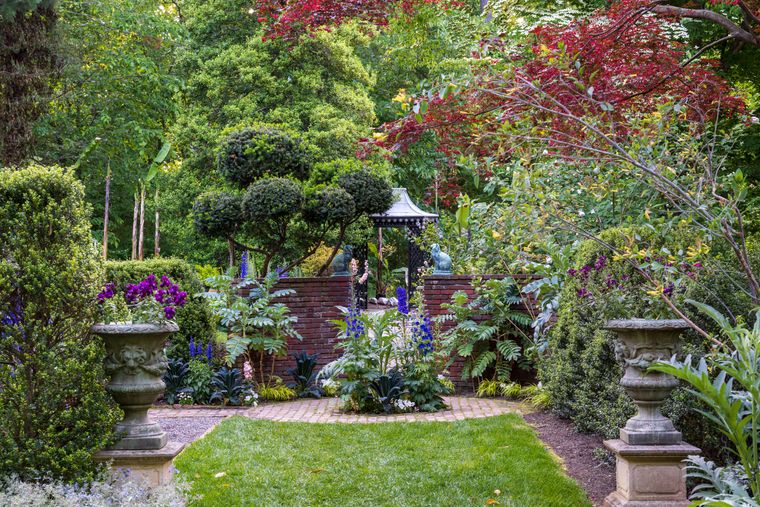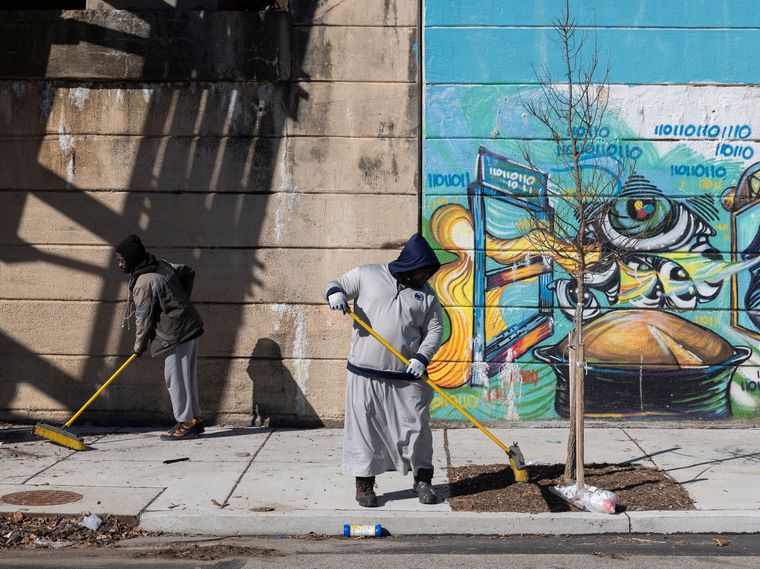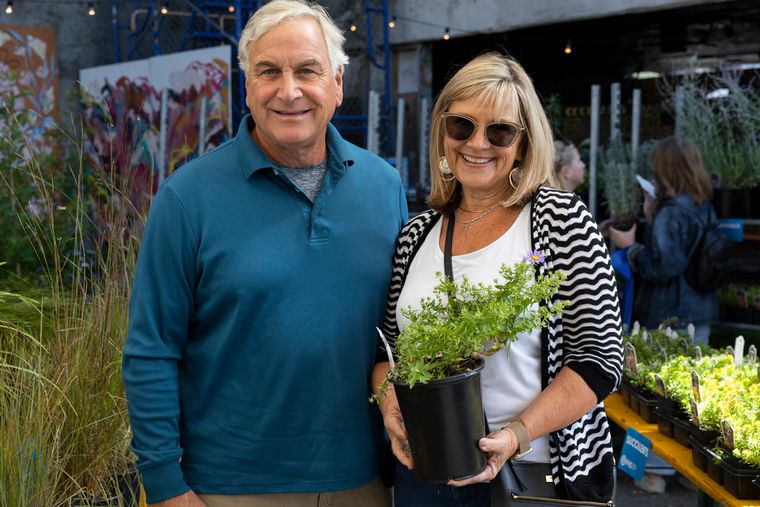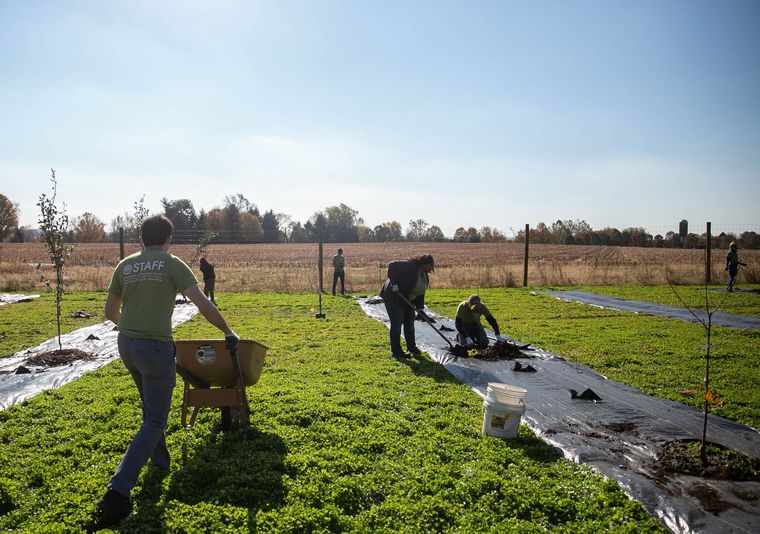



6 Ways to Embrace a Sharing Mindset in the Garden
phs community & events

By Andrew Bunting, PHS VP of Horticulture
“Embrace a Sharing Mindset” is one of the principles of the Pennsylvania Horticultural Society’s Gardening for the Greater Good ethos. We encourage all gardeners to share their passion and enthusiasm, their harvest, and their time to support other budding gardeners.
There are several approaches to consider when we “share” in the garden. Here are six ideas to get started.
1. Be a Garden Mentor
Many beginning gardeners are seeking information from a variety of sources as they begin their gardening journey. Being a mentor to these new gardeners will impart your knowledge to them, but it will also get them excited about gardening. You might engage with neighbors who are just starting their gardening journey, or you might get involved with local horticultural clubs or societies. Just knowing you are available to answer a few gardening questions can be transformational for a new gardener.

2. Donate Your Extra Vegetables
PHS has a program called City Harvest, whereby 120 community gardens across Philadelphia commit to contributing 10% of their harvest to a local food bank or food pantry. A community garden increases access to fresh food, and this same approach can be taken at a hyper-local level whereby individuals can share with other individuals in their neighborhood. Additionally, post-pandemic, many food banks are accepting fresh produce, offering another avenue for individuals to donate to those in need.

3. Share Extra Seeds
Often when you buy a packet of seeds, it is more than you need. Embracing a sharing mindset when it comes to gardening would suggest that you share these extra seeds with your neighbors, or perhaps with a local community garden. Many towns and municipalities are now sponsoring “seed swaps” where anyone can attend and exchange packets of seeds. Many gardeners also collect their own seeds of peppers, tomatoes, beans, and peas at the end of the season to use for themselves and share the following season. Additionally, several institutions have been promoting the harvesting of important heirlooms and culturally important seeds, including Treelove Seeds, which is based in Philadelphia, and Seed Savers Exchange in Iowa.

4. Propagate Your Plants
Many of the most memorable plants in the garden will be those that have been shared by a fellow gardener, a family member, or a friend. These are often referred to as “pass-along plants.” In fact, many heirloom selections have been shared and passed along for generations.
There are many methods of easy plant propagation that you can use to replicate plants in the garden. Any clump or spreading perennial can be “divided.” By using your hands to dig up an entire clump and pull apart the perennial, you can create several new clumps. Or, if it is a perennial with tenacious roots like hosta, daylilies, or many of the ornamental grasses, then divisions might need to be made by cutting the perennial into sections using a saw, axe, or a Japanese digging knife, hori hori. Extras of all these plants can be shared with your neighbors and friends.
Another approach is to take softwood cuttings in mid-spring. At the end of the branches, take cuttings that are three to four inches long just below the lowest set of leaves. At most hardware stores you can find rooting powder which will aid in the formation of roots. Put a little rooting powder on the base of the cutting and put the cuttings into a four-inch or six-inch diameter pot. Mist the cuttings and then cover the pot with a transparent bag and secure the bag to the pot with a rubber band. It is critical to make sure the cuttings stay moist. Put the pot under grow lights, or on a windowsill with indirect light. Depending on the plant, the cutting will root in two to six weeks. The rooted cuttings can then be teased apart and the individual plants put into their own pots. Keep the new plants watered and out of direct light until they are well-established and can be shared.

5. Attend a Plant Swap
Plant swaps are becoming increasingly popular. PHS regularly hosts Plant Swap events that are set up where anyone can bring plants, cuttings, and garden products to share. Many plant swaps tend to focus on houseplants and participants bring young houseplants, cuttings from jade plants, spider plants, etc. You can also bring extra pots, potting soil, and fertilizers. The idea is that for whatever you bring, you can trade it for something new, and support other gardeners in the process.

6. Volunteer and Get Involved
Volunteering is an excellent way to give back to your community and share your gardening skills. This could mean working with a local school on a gardening project or working with a faith-based organization. There are also many regional horticultural societies that are doing community-based work, as well as plant societies such as the Begonia Society, Indoor Plant Society, Cactus and Succulent Society, etc. Additionally, most towns, cities and municipalities across the country have local garden clubs often hosted by organizations such as the Garden Club of America. Community gardens are another great place to get involved. In addition to having your own plot to garden, you might help with work that is needed elsewhere at the site.
Gardening can be shared in a variety of ways. Just answering some questions and giving guidance to a new or novice gardener can be a turning point in their evolution as a gardener. Many vegetable gardens in the height of the summer are very productive; so much so that there is often more being produced than there is to self-consume. Share this bounty with your neighbors or the local food bank. Additionally, plants in the ornamental garden are always growing and expanding. Take divisions and cuttings from your garden and share, and get involved with the myriad of clubs, societies, and local community gardens to share your expertise and learn from other gardeners.
Interested in Gardening for the Greater Good? Sign up for PHS's monthly newsletter.


